





As April approaches, we conclude what has been another busy financial year for both our own team and our partners. We have another bumper edition of Fuel Poverty Focus to showcase the fantastic achievements of National Energy Action and our members.
As Head of Fundraising and Partnerships, I wanted to firstly take this opportunity to thank all of our members and supporters for their continued support this financial year. It has allowed us to continue our vital work supporting people across the UK in fuel poverty, to both build capacity within the charity and to also provide much needed direct hardship support to our clients.
In this edition we showcase the range of events and activities that have taken place over the winter including our first Walk for
Warmth, our annual House of Lords reception and our first in-person Wales conference in over four years. But that’s not all. We have been busy planning for the year ahead and have a number of new initiatives which we need you to continue to support in any way you can. Be that by continuing your membership or getting involved in one of our fundraising events.
We hope to continue to engage with our members throughout the new financial year and to see you in person at our forthcoming regional fuel poverty forums during April and May.
Thanks again.

03: Policy in Focus
Ofgem’s new price cap
04: Events in Focus
Our House of Lords event
05: Events in Focus
Our Wales Conference: Energy Crisis: two years in, in Cardiff
06: Members in Focus
RES, PECT and EDF reveal their projects
08: Members in Focus
Severn Wye, FRAME and the Community Councils for Somerset
10: Members in Focus
Life-changing projects including soup and warm homes
14: Fundraising in Focus
Our first ever Walk for Warmth
16: Project in Focus
Our Fuel Poverty Monitor, plus one year of Leicester Energy Action
18: Research in Focus
Our project with Marie Curie and how to help fundraise for us
About Fuel Poverty Focus
Fuel Poverty Focus is the quarterly magazine, produced by National Energy Action, for its members. If you have content ideas for next issue and beyond please email focus@nea.org.uk
Newcastle Head Office West One, Forth Banks, Newcastle upon Tyne, NE1 3PA

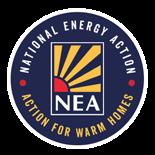
Energy prices are beginning to fall.
But, as National Energy Action client Lynn says: ‘Of course, bills going down will make a difference, but it will still be too much for me to cope with.’ Lynn, and around 6 million other households in the UK, will still be trapped in fuel poverty.
This drop in bills means that the ‘typical’ consumer will face an annual bill of £1,690. That is a drop of about 12% compared to current prices. If you use a ‘typical’ amount of energy, as calculated by Ofgem, then this is what you’ll pay annually, but if you use more then you’ll pay more.
A reduction in prices is always good news. It means that households can spend less money to get the same level of warmth and comfort at home. And it will mean that many households that have been rationing their energy use can use a little bit more.
turned their thermostat down lower than they wanted, while 52% said they had turned their heating off, even though it was cold inside the house.
6 million UK households are still in fuel poverty
Unfortunately, the energy crisis, which has gripped millions for two and a half years continues. The new price is almost 50% higher compared to pre-crisis levels. National Energy Action estimates that at the new price level, 6 million households across the UK remain in fuel poverty.
And there is another factor at play. While the UK government has given support to householders over the last 18 months, this is coming to an end. Cost-of-living payments totalling £900 for households receiving means-tested benefits and £150 for those in receipt of disability benefits will soon end. This cut to income is not offset by reducing energy prices. Many households will be worse off from April.
This is hugely concerning. National Energy Action polled adults across Great Britain in January with YouGov, to see how people were coping with sustained high prices. We found that three in 10 (30%) say their household has found it difficult to afford to pay their energy bills in the preceding three months. Alongside this, 59% of British adults said they had
These figures, awful enough by themselves, are backed up by the experiences of people like Lynn, who recently told her story to the country through our press release on the price cap changes. She says, ‘I do everything I can to keep my bills down. I’ve got an egg timer in my shower to keep them short. I’ve got foil behind radiators, sealants on the doors. I don’t have my heating on – my home stays around 12-15°C. Coming home to a cold home, with my osteoporosis, is really hard. The government should be providing more support for people’s energy bills.’
These are drastic measures, driven by structures that have led to an unaffordable essential commodity. And they affect society as a whole, not just the individual. Colder homes impact health and wellbeing. They cause a drag on the economy, as money that could be spent on other things is sucked up by power, heating and paying off debt. Warmer homes for those who struggle are of benefit to us all.
More must be done to help and it starts with price. A social tariff for energy – an affordable price for those on low incomes – is the best way to achieve this.
Unfortunately, current prices are not the only issue. High prices from last winter led to record levels of debt in the market – over £3bn is owed collectively to suppliers. We must not only help people pay for their heating going forward but help them pay the debts of winters past. This should be a job for the Treasury, which has a vested interest in households being debt free, with more money to spend in their local economies.
But these alone won’t end fuel poverty. Over three million lowincome households in England alone live in the leakiest houses, spending an average of more than £417 extra a year on bills compared to those whose homes are more efficient. We drastically need an ambitious plan to insulate these homes, wrapping our arms around those who have been left worst off by this crisis. That will require new spending. And it will require new legislation.
All of the solutions are known. We just need to take the decision to do it.

On 19 March, we launched our new project with Energy Action Scotland and Cadent, Northern Gas Networks, SGN and Wales & West Utilities
Over 100 supporters joined us at the House of Lords on Tuesday 19 March, with Baroness McIntosh and Amanda Solloway, MP, Minister for Energy Consumers and Affordability.
At the event, we launched Warm Homes, Healthy Futures, an evidence-based, multi-year, GB-wide programme. It will connect health professionals and local public health bodies with energy advice and other specialist services.
Together, we will help people live in warm and safe homes, and ultimately improve health. Working closely with our sister charity Energy Action Scotland and supported by gas distribution networks Cadent, Northern Gas Networks, SGN and Wales & West Utilities, as well as our delivery partners across England, Wales, and Scotland, the first phase of the programme begins in May.
Cold, damp and energy inefficient houses exacerbate people’s existing medical
conditions, leading to health inequalities.
Our collaborative programme will be coordinated nationally, and delivered locally in communities, where there is high need and limited existing support to help those who need it most.
We will offer essential services such as energy advice, income maximisation, servicing, and home improvements. But the programme is bigger and more ambitious, than just rolling out our existing services. By addressing the root causes of fuel poverty and targeting those most vulnerable, we aim to make a tangible difference to tens of thousands of people’s lives. And we plan to leave a lasting legacy. Go to www.nea.org.uk/news/ warm-homes-healthy-futures.
Thank you to Cadent, Northern Gas Networks, SGN and Wales & West Utilities for sponsoring the event and to Baroness McIntosh for hosting.
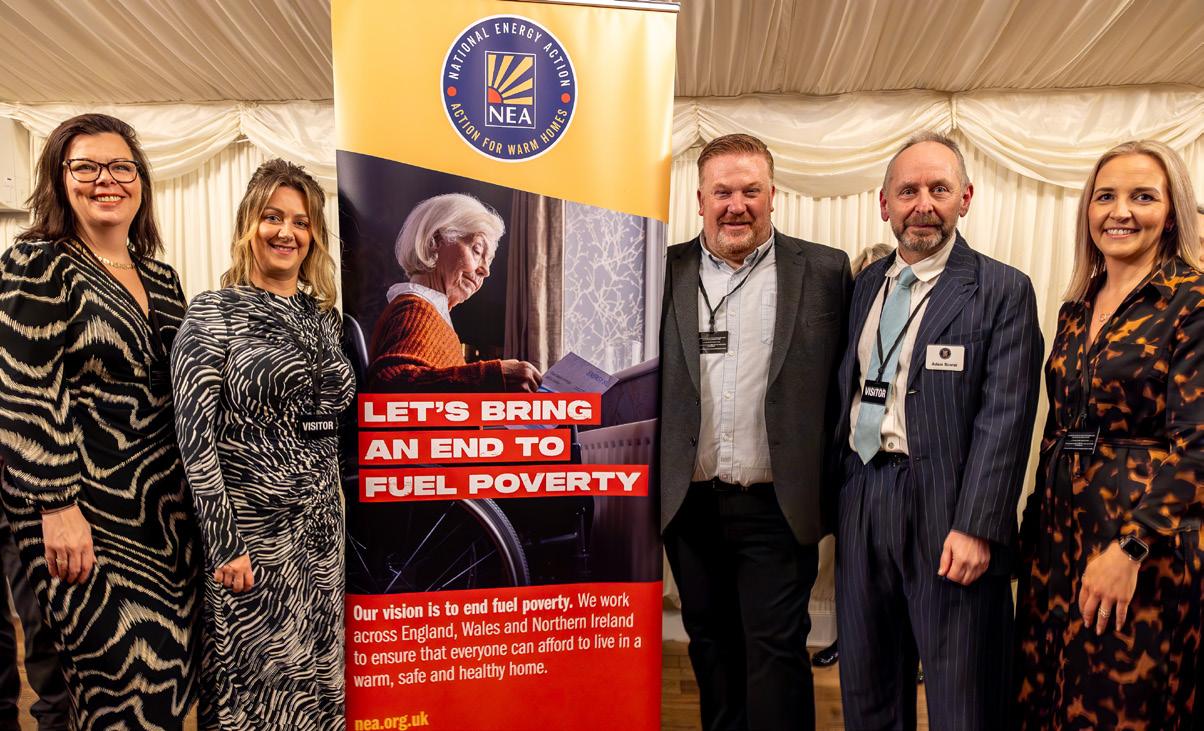
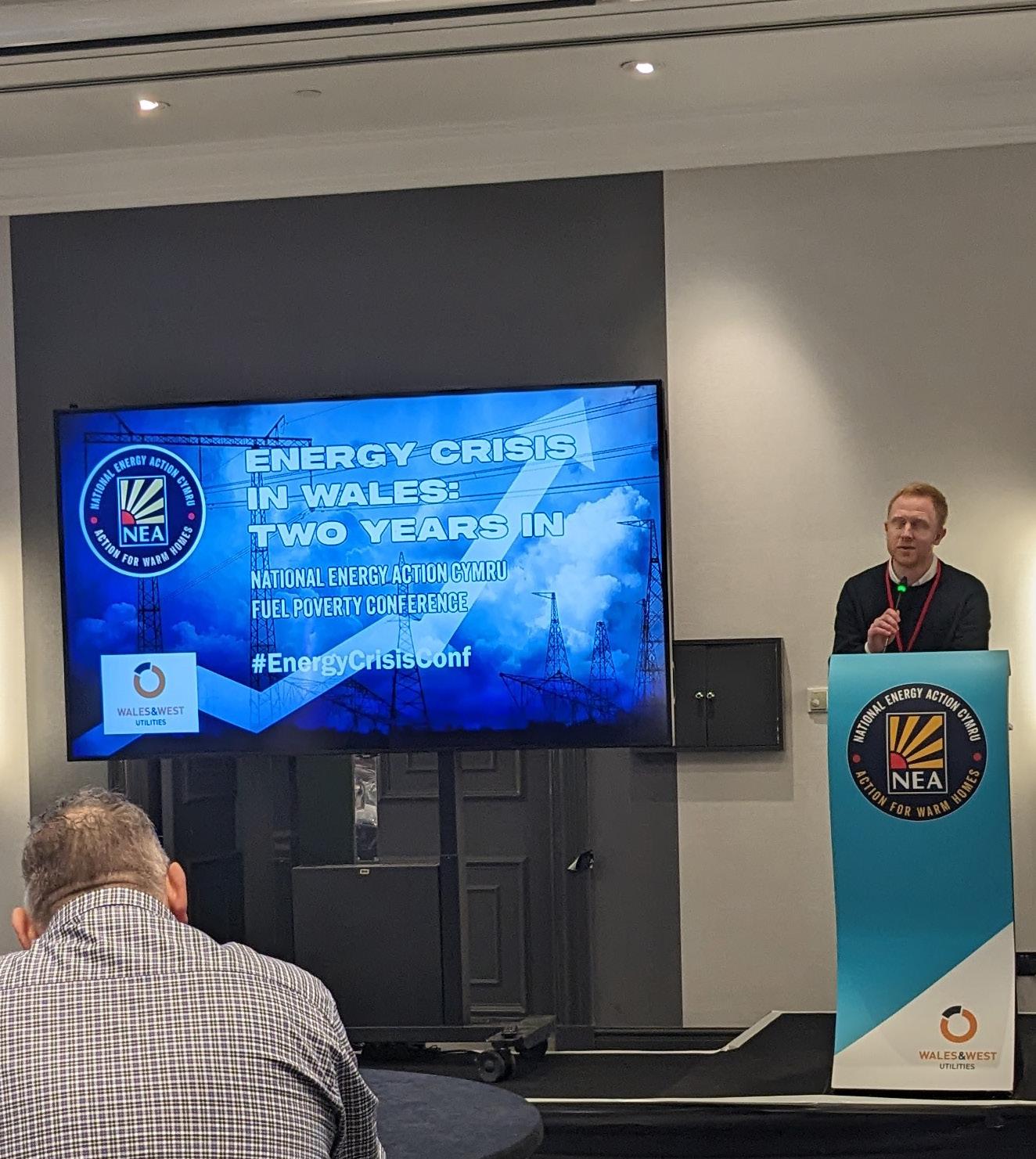


Over 160 delegates came together for National Energy Action Cymru’s first conference since the onset of Covid. We met in Cardiff amid an energy and cost-of-living crisis where energy prices have been the highest in a generation, and the need to support low-income and vulnerable households has never been greater.
Our Head of Wales, Ben Saltmarsh (left), said the context around fuel poverty has changed dramatically and significantly over the past two years. As energy prices have rocketed, so too has the number of those living in fuel poverty in Wales. It is estimated that up to 45% of households are fuel poor, which includes virtually all of Wales’ lower-income households, over four in 10 of whom are estimated to be in deep, severe fuel poverty.
Given this bleak picture, the day-long conference needed to be one of truth and honesty, a space to express anxieties and anguish. It was also a conference of hope
and ambition, and it provided a look into the future to learn what is possible when we work together.
The day offered a crucial opportunity for stakeholders from across sectors to come together to discuss the ongoing crisis and its impacts in Wales, and to learn more about what needs to be done to help the hundreds of thousands of people unable to keep warm, safe and healthy at home. More than 25 speakers shared their insights and expertise with delegates.
harrowing details of what they’re seeing on the ground, to emphasise the urgent need to support those in the most vulnerable circumstances.
Tackling fuel poverty is a challenge. But one we don’t have to face alone
Jane Hutt, the Minister for Social Justice and Chief Whip, highlighted the energy crisis in Wales and the ‘collective purpose’ to tackle fuel poverty together.
Leading frontline organisations shared insights from their delivery work, while local grassroots charities shared the

Public health colleagues highlighted the importance of making warm homes a preventative health priority in Wales, to highlight how we can work together to tackle health inequalities and put an end to a cycle of hospital admission, discharge, and readmission. Industry experts shed light on the challenges in the retail energy market and how we can make it fairer and more affordable for fuel poor households. Local authorities and housing associations explored the needs of tenants across the private rented and social housing sectors.
Ahead of the launch of the Welsh Government’s next Warm Homes Programme, we heard about the need to upgrade the energy efficiency of fuel poor homes in Wales, how we can maximise opportunities from UK-wide schemes, and what more needs to be done in this area.
We also heard from our sponsors, Wales & West Utilities, who spoke about the Vulnerability and Carbon Monoxide Allowance, and the importance of working together to make a difference for people in Wales.
There is a real benefit to tackling fuel poverty and the cost of doing so is an investment in better lives, safer homes, and a healthier future. Tackling fuel poverty is a challenge, but one we don’t have to face alone.
The conference was a crucial reminder of this, showing that we can work together to make more people warm, safe, and healthy in their homes.
Residential Energy Services has helped over 20,000 households in the UK with face-to-face advice on energy efficiency measures. It aims to help those who are considered ‘hard to reach’...
Residential Energy Services (RES), in consortium with marketing experts Socially Grown, have launched The Warmer Homes Project, a new mobile energy advice service for hard-to-reach households.
The project was launched after successfully securing £373,329 of funding through The Midlands Net Zero Hub, together with the Department for Energy Security and Net Zero.
RES is one of only nine successful applicants to the Government’s Local Energy Advice Demonstrator Programme (LEAD) funding innovative new approaches to providing energy advice to those in need. Nine pilot projects are being delivered, exploring innovative approaches to providing in-person, home energy advice to consumer groups in the Midlands, including hard-to-reach consumers like the
elderly, those with limited internet access, and minority ethnic groups.
Since 2014, RES has provided energy subsidy awareness and advisory services to over 20,000 individual households in the UK, engaging face-to-face with householders to advise on energy efficiency measures. RES specialises in educating householders on energy saving measures and managing the customer journey from initial advice through to installation.
fuel bills and improve housing stock.
Sarah Parry, Managing Director of Socially Grown/Residential Energy Services, said: ‘Through this initiative, our objective is to pioneer a transformative approach.
Pilot projects explore innovative approaches to in-person energy advice
Throughout the regions of Staffordshire and Shropshire, a community outreach and education vehicle has been providing a local, mobile way to raise energy efficiency awareness, integrating with hard-to-reach householders, and co-creating energy plans to help reduce
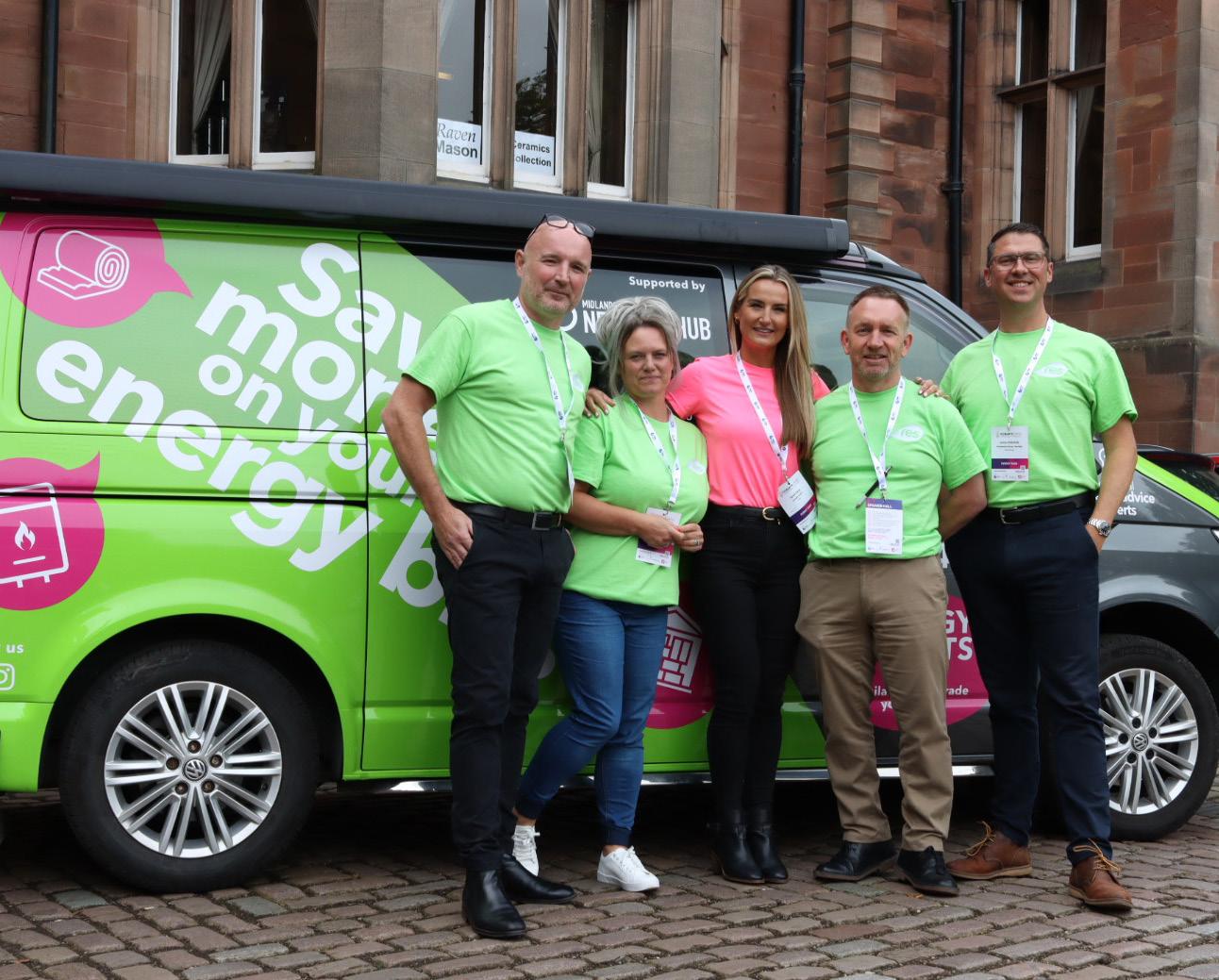
It caters to the energy advisory needs of underserved communities, by introducing a mobile energy advice service.
Leveraging our expertise and forwardthinking methods, we are committed to delivering in-person advice, tailored to each individual home, addressing individual needs and co-creating meaningful action plans and retrofit assessments that result in energy saving measures being installed.’
The Warmer Homes Project aims to provide 6,000 householders per year with immediate access to experienced energy and retrofit advisers, as the RES pop-up hub appears in key locations such as health centres, community centres and rural shows. The project runs until March 2025.
Jaywick Sands is a coastal resort in Essex built in the 1930s as a holiday resort for Londoners. After the Second World War, a shortage of housing meant the prefabricated properties and chalets gradually became permanently settled, despite not having been designed as full-time family homes. Many are now in poor or dilapidated condition.
The design of these properties means they are very energy inefficient and, as a result, costly to keep warm. Many homes here are not connected to a mains gas supply, so expensive electric heating is often the only option for residents.
EDF has worked in partnership with Insulation and Heating Installations Ltd (IHI) for over six years to provide ECO funding for qualifying households in Jaywick. Through this close working relationship, EDF
Over the last year, Peterborough Environment City Trust (PECT) has partnered with Cambridgeshire ACRE on the Cambridgeshire Home Energy Support Service Plus (CHESS+) project.
Through this project, households in the Cambridgeshire area can access free energy advice and support, including help to improve the energy efficiency of the home and to access financial support for energy bills. The CHESS+ project also provides grants for energy debt relief and solid fuels to households in crisis.
Since the start of the project, PECT has supported over 850 households through a mixture of phone calls, home visits, and events. Out of these, 65 households were further supported with crisis grants funded by the CHESS+ project. In total, they have helped households access almost £90,000 of financial support and saved around 50,000kWh of energy.
PECT also partnered with Rural Citizens Advice and Fenland District Council to provide winter warmth packs to 200 elderly residents of Fenland. The packs contained a range of items to help people keep warm and safe, including a hot
50,000kWh
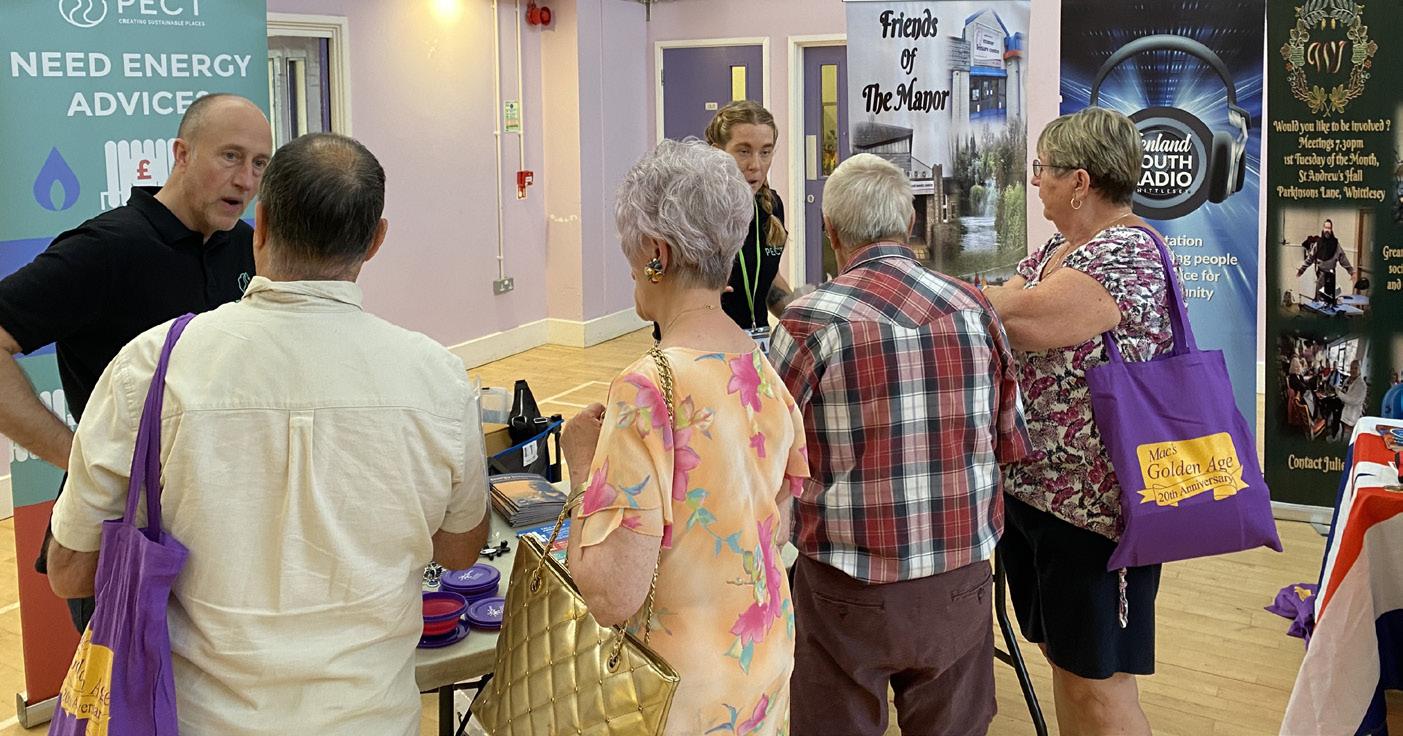
water bottle, a blanket, a hat, socks, gloves, a fleece snood, and an emergency torch. These packs were distributed at the Golden Age Fairs in the Fenland area, which PECT attended to raise awareness of the advice and support available to elderly people concerning their energy use. PECT has also provided a drop-in advice service at a range of community venues and events, including food banks and cost-ofliving events, allowing them to reach out to more vulnerable people. Where more complex issues are identified, they can
then book individuals in for a further advice call or home visit.
The service is continuing to receive many referrals, and the support has been well received by local residents who are struggling with the increased costs of living, with one of their service users saying, ‘Thank you very much for your support with our issue, especially for helping us to speak to their energy supplier and provide a grant to clear our energy debt. Without this help, we don’t know where we would have gone.’
Go to: www.pect.org.uk/energy-advice.
has provided funding to ensure any qualifying household can apply for energy efficiency measures being installed to their homes.
As well as ensuring homes are insulated, this funding has also allowed renewable heating measures to be installed to householders in Jaywick with the installation of approximately 50 air source heat pumps via CB Heating. In addition to this, EDF’s ECO funding has also ensured up to 100 UKSol solar PV measures have been installed to support the air source heat pumps and allow householders to benefit from much-needed lower energy bills.
EDF has received some really positive feedback from residents who have benefited from having ECO-funded energy efficiency
measures being installed in their homes. EDF recently visited one householder who had loft insulation, an air source heat pump and solar PV installed, and their comments were:
‘My home is already much warmer, I’ve felt the difference already.’
‘It was easy to make an appointment with IHI.’
‘The installers arrived on time and made no mess, professional.’ EDF is proud to have supported the community in Jaywick through their close working relationship with IHI. To find out more about how EDF can help with retrofit funding, please email: ecoflex@edfenergy.com.

Severn Wye has supported those vulnerable to fuel poverty in Wales and England border counties
‘Without your service I would probably be homeless’. Those words, from one of the many people who reached out to Severn Wye last year, show just how deep the energy crisis has cut for many. Last year, they supported over 5,000 people in their region of Wales and the England border counties – 90% of these were vulnerable to fuel poverty.
Severn Wye is a sustainability charity and non-profit, tackling climate change by empowering people to use energy efficiently – in their homes, businesses and communities.
Many of the people calling have fallen into fuel poverty for the first time, with rising energy costs and the cost-of-living crisis continuing to hit hard. Severn Wye colleagues take calls from people who have hit rock bottom; who sometimes talk about suicide, and can’t find anywhere else to turn. The community-based
The Energy Support Savings Team of Warrington Disability Partnership is a team of four advisers - all qualified to level 3 by National Energy Action. They have been delivering their service since April 2023.
All are dedicated to the role in supporting the most vulnerable in their hometown of Warrington with advice, support, grants and, above all, a listening ear to the issues they face week in, week out.
In March, they held their AGM and were thrilled to have won ‘Team of the Year’. They said it was an accolade just to be nomninated, let alone win and shows how necessary their work is.
‘The Mayor of Warrington presented us with our award and told us to keep up the fantastic work we do,’ said Veronica Hudson, from the team.
advisers have to be flexible and intuitive too, with a sound knowledge of local services. It’s not unknown that they arrive expecting to deal with a family’s fuel debt and for them to find empty food cupboards or not enough clothes for the children. Through their strategic partnerships they can get people access to the range of support they frequently need.
When homeowners have money to spend on retrofit projects, Severn Wye’s experts will help them navigate the huge amount of information out there about energy-saving measures and renewables so they can invest in a way that’s right for them. But most of the people they work with have neither money nor information.
Severn Wye’s community-based advisers visited 1,400 households last year and gave out £550,000 in emergency funding. In January, they launched their advisory service in Monmouthshire – a first for the county that will connect with partners in social housing, health and social care in a region that also suffers from a lack of transport, poor digital
infrastructure, and low-grade housing stock.
Severn Wye is proud of the difference it makes as a charity, but year on year sees the need for services growing. The price cap change in April means bills are still 50% higher than they were two years ago, and too many people are at the cliff edge.
Only government commitment and investment can turn that tide. That’s why Severn Wye joined with National Energy Action and more than 30 other organisations earlier this year to sign a Warm Homes Plan statement. It sets out priority actions for the next government to meet the UK’s fuel poverty and net zero targets. Without long-term investment in retrofitting to insulate and upgrade the UK’s housing stock, people will continue to struggle with unnecessarily high bills and the damage to health and the climate that results from leaky homes. Severn Wye hopes for change, but in the meantime, the charity and non-profit organisations like them will continue to work at the front line until support for fuel poverty is no longer needed.
Thank you to everyone who attended our Business Supporters Group mini conference in London on Tuesday 19 March.
National Energy Action’s Chief Executive Adam Scorer started by discussing priorities ahead of the General Election. Our Head of Policy Matt Copeland presented our Fuel Poverty Monitor findings, showing an £18 billion shortfall in energy efficiency measures to meet current legal fuel poverty targets.
Then our Director of Homes Colin Timmins led an interactive session where the whole group discussed the pros and cons of past and present retrofit streams, looking at what worked and what didn’t.
There were also opportunities for our members to update everyone on their work and discussions on how we can work together to help fuel poor households. Thank you to everyone who attended.
You can read more about the Monitor and its findings here: www.nea.org.uk/ publications/uk-fuel-poverty-monitor-nationalenergy-action-2022-23.

Funded by the Energy Redress Scheme, the West End Warmers service helps residents aged 50 and over
Search Newcastle is a charity in the West End of Newcastle that assists residents aged 50 years and over in the area with their West End Warmers service.
It offers energy advice funded by the Energy Redress Scheme for clients who are experiencing various energy issues or general queries with their energy suppliers.
Home visits can be arranged to do home assessments for small energy measures for the residents of NE4, 5 and 15. Clients can self-refer or be referred to the service by external organisations. The small energy measures on offer are LED light bulbs, radiator foils to place behind the radiator, and draught excluders. These small measures are very popular in helping to improve the mental wellbeing of the clients by retaining the warmth in the home
and assisting them financially to a degree by keeping the cost of heating the home down. With the cost of energy still remaining high, the project has been able to reach out and assist over 1,000 clients in the last two years, either at advice events, group sessions, face to face, or via telephone and email.
Support is offered by engaging with the client on a number of issues ranging from energy
debts, submitting meter readings, challenging energy bills, lack of billing, and smart meters that are not functioning as they should.
Complaints are also written on behalf of the client to the energy provider and, in some cases, escalated to the Energy Ombudsman with positive outcomes.
For more information on Search Newcastle’s work, go to: www.searchnewcastle.org.uk.


The Community Council for Somerset has made supporting their communities with the impact of fuel poverty a top priority.
Last winter, the Community Council for Somerset (CCS) charity allocated just under £50,000 of Surviving Winter Grants, funded by the Somerset Community Foundation. This year, they are looking to increase that to £83,000. This winter’s grants have been open since November 2023 , and CCS has already given over £39,000 to the most vulnerable in the county to help with their bills or to make small changes to keep warmer, such as thicker quilts or curtains.
As well as the Surviving Winter Grants, CCS launched their winter ‘Knit for your Neighbour’ campaign encouraging people to knit, crochet, sew or donate blankets, which their team of Village Agents then distributed to those in need.
Val Bishop, CCS’s Chief Executive, said, ‘Our Knit for Your Neighbour campaign has been hugely successful with well over 250 handmade or donated blankets received. The campaign has been a great example of our approach to championing community-based support. Winter
can be a tough season with people feeling the effects of fuel poverty, but also suffering from feelings of loneliness and isolation.
‘We wanted to encourage individuals and groups to come together to make blankets, creating opportunities for social interactions through an activity that has many health benefits and is accessible to a range of age groups and levels of mobility. The outcome has been being able to gift people in tough situations something that has been made with love and creativity.’
CCS’s team of Village Agents also hosted 25 energy saving-focused events across Somerset as part of National Energy Saving Week in January. They were joined by over 300 people and gave away 200 goody bags full of energy-saving, warmth-giving items donated by our partners, including National Energy Action. Several ‘cooking on a budget’ demonstrations were held and offered plenty of hints and tips with ingredients to take home. Many took part in free quizzes and raffles to win slow cookers, hot water bottles, warm bags and thermal cooking bags.
For more information about CCS and the work they do in Somerset, visit: www.ccslovesomerset.org.
Older Not Colder is a new, Waleswide project, delivered by Care & Repair Cymru and supported by Wales & West Utilities. The project aims to tackle fuel poverty to help those aged 60 and over in low-income households.
The project has 12 specialised Home Energy Officers working across the whole of Wales to improve living conditions through energy efficiency measures, making energy bills more affordable to keep people warm and safe in their homes.
The project will work directly with older households in Wales to address challenges exacerbated by the cost-of-living crisis, high energy prices and the pandemic. The Home Energy Officers will focus on energy saving measures, increasing household income and targeted energy advice to support older people’s overall health and wellbeing.
This service is dedicated to reducing the incidence and impact of fuel poverty for
older people in Wales - a demographic that faces additional challenges from cold homes. Figures show that 75% of excess winter deaths occur in people aged 75 and older, with cold and damp homes exacerbating respiratory problems, increasing the risk of heart attacks and strokes, and linked to increased incidence of falls and hospital admission rates. Older Not Colder will aim to address the problem of cold homes in the older population, reducing pressures on the Welsh health service and empowering older people to look after themselves through improving the energy efficiency of their homes.
around 15% of their household income to pay for their gas and electricity bills, putting them within the Welsh Government’s definition of fuel poor. This is why the new Older Not Colder service is needed now, more than ever.
The project empowers older people to improve their home’s energy efficiency
Using a randomised sample of clients that engaged with our previous fuel poverty service showed that our clients are still spending
Without the introduction of a social energy tariff for low-income households, or a reform on standing charges, which have risen 64% since the introduction of the price cap in 2019, older people in Wales will continue to struggle to make ends meet. Long-term policy solutions are needed to ensure people can keep the heating on to stay safe and warm at home, preventing cold-related illnesses and further hospital admissions. In the meantime, Older Not Colder hopes to provide a lifeline for many vulnerable households in Wales.
The Centre for Sustainable Energy (CSE) has developed new information for energy advisers or clients about the Demand Flexibility Service (DFS). The DFS scheme from the National Grid Electricity System Operator (ESO) rewards customers for reducing electricity use at peak times. Demand flexibility will be important in our future net zero energy system, but CSE says everyone needs to be able to join in and reap the benefits safely.
Care & Repair Cymru to launch Older Not Colder, a new service dedicated to tackling fuel poverty depend on the type of household you live in and what electrical devices you normally use during peak times.
With the DFS back until March 2024, they turned their research into practical advice on taking part. It’s a unique contribution to demand flexibility participation – no one else has done this.
Is taking part in the DFS for you?
Last year, CSE researched people’s experiences of the DFS. They found that most people enjoyed taking part, but also revealed barriers to participation for some groups. www.cse.org.uk/researchconsultancy/consultancy-projects/ consumer-experiences-of-the-demandflexibility-service
Participating in the DFS offers small financial rewards and other benefits like learning about your energy use and supporting a low-carbon energy system. But not everyone is able to earn the same amount, and it’s important only to take part if you can do so safely. This site helps people figure out if taking part is for them: www.cse.org.uk/advice/taking-part-in-thedemand-flexibility-service.
How much could you really earn through the DFS?
The rewards you earn through the DFS
CSE crunched the numbers to help you figure out how much you’re likely to earn: www.cse.org.uk/advice/how-much-couldyou-earn-demand-flexibility-service/ How does your household compare to those who’ve taken part?
CSE looks at three real households that took part in last winter’s DFS and how much they earned in rewards. Go to: www. youtube.com/watch?v=YhwfM1VBD-s.
CSE is dedicated to championing social inclusion and fairness in the UK’s energy transition through our Smart and Fair research programme.
Go to www.cse.org.uk/smart-and-fairenergy-transition.
20 Electricity North West apprecntices cycled 400km to raise funds
The Wise Group believes in breaking down barriers to create lasting change. Their innovative Relational Mentoring approach has revolutionised support for individuals, transcending traditional boundaries between health, employability, energy, and housing assistance.
As part of their joint Commission on Breaking Down Barriers to Employment Opportunity, this month Wise Group CEO Sean Duffy and Lord Walney of the Purpose Coalition, co-chaired a roundtable with energy leaders. This included E.ON, Centrica, Octopus Energy, UK Power Networks, Ofgem, National Energy Action, Wise Group mentors, and many more.
The roundtable marked the launch of The Wise Group’s latest fuel poverty report, making bold and practical recommendations to support people with their energy costs with holistic, mentoring support.
Insights that matter
In this latest report, they’ve harnessed the insight from millions of meaningful interactions facilitated by dedicated professional mentors across the UK. These insights have paved the way for clear recommendations that can transform lives and foster sustainable change.
Comparing this winter to the last, the report uncovered critical trends:
• Sustained hardship - prolonged difficulties have taken a toll on mental and physical health.
• Families in need - families with children are increasingly reliant on food banks.
• Growing demand - households now seek more than just financial aid; they crave holistic support.
Here’s what the data revealed:
• Fuel voucher eligibility - over 75% of prepayment meter users reported health impacts due to the cost-ofliving crisis.
• Working families - 30% of working families turned to food banks for assistance.
• Disability challenges - 82% of people with disabilities experienced health deterioration due to high energy prices.
• Single parents - 81% of single parents faced health challenges related to the cost-of-living crisis.
This comparison shows that despite lower energy costs, hardship remains consistent
with last winter. Health has significantly worsened, likely due to enduring tough winters.
But, the biggest change is in support attitudes. Last year, 76% solely sought financial aid, compared to just 35% this year. It suggests households now seek comprehensive support for lasting solutions to their crises.
1. Fair debt consolidation and repayment system: let’s ease the burden of debt.
2. Integrated home energy, health, and employment support: holistic solutions for holistic well-being.
3. Impactful relational mentoring: dedicated mentors for every household in need.
4. Equitable energy pricing: a model that ensures fairness across communities .
The Wise group says, ‘We are part of the solution. Let’s engage in conversations that spark change, make connections that foster collaboration, and share ideas that redefine our approach. Together, we can uproot poverty and take the opportunity to do something different, to be the architects of change.’
The Commission will be hosting further roundtables in the coming weeks, and will launch its first report in May. They thank Lord Walney and all contributors for their invaluable support in bringing these crucial insights to light.
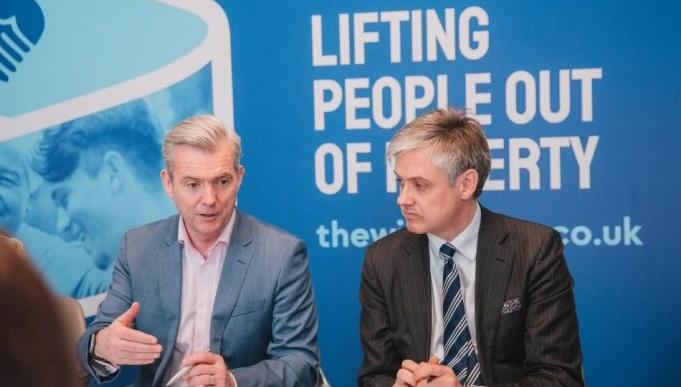
More than a thousand homes have been equipped with cutting edge energy efficiency measures, including Richard’s
Richard Worrell lives in an apartment block in one of England’s poorest neighbourhoods. In an inspiring short documentary, the Walsall resident gives an account of life in ‘the ice blocks,’ both before and after a groundbreaking £7.9 million community regeneration project.
More than a thousand homes within 21 tower blocks across Walsall’s four housing estates have been equipped with cutting-edge energy efficiency enhancements. This redevelopment project not only revitalises living conditions but also makes warmth and comfort more affordable for its residents.
Through strategic collaborations with Soltherm and Surefire Management Services, Watmos Community Homes secured pivotal funding from the Social Housing Decarbonisation Fund (SHDF), amounting to an impressive £7.9 million investment; the biggest single investment for a project of its kind.
Watmos’s aim was for all properties to achieve SAP band/EPC C standards, which is a requirement for both SHDF and Energy Company Obligation (ECO) funding.
The external wall insulation system usedthe Soltherm Endurance 75 system - is BBA approved and recognised as an Innovation Measure by energy regulators, Ofgem. This boosted ECO funding with an uplift of 25%.
Stephen Gapik,Managing Director of
Soltherm, said: ‘Energy efficiency means that we use energy better, and that ultimately means that people who live in the flats and the houses here have a better quality of life.
‘They pay less for their energy bills, and they’re warmer. A lot of populations of these buildings are quite elderly on a fixed income. So, it’s really important to make sure that we’re able to provide these type of measures to these communities.”
Richard’s personal account details how this investment has enhanced the wellbeing of vulnerable individuals in his hometown. ‘I was involved with the estate, more than 20 years ago. And I worked with residents, and we used to call these places ‘the ice blocks.’ So that says it all really, doesn’t it?
‘You noticed the difference instantly once the thermal cladding was in place, it just made it so noticeably more comfortable. It just makes this place so much nicer to live in.’
In recognition of making homes safer, modern and more energy efficient, Watmos has received the National Energy Efficiency Award 2023, in the Multi-Measure Project of the Year category for this regeneration project.
This inspiring watch showcases a journey from cold, unwelcoming spaces to warm, energised homes that offer health, comfort, and vitality to Walsall’s fuel poor population. The Watmos Regeneration Project is available to watch now on the official Soltherm website.
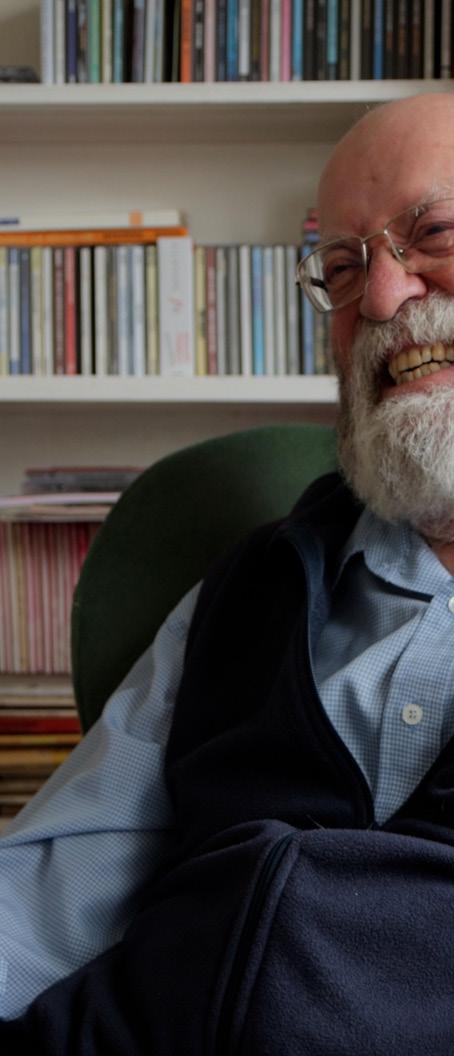
The work in Walsall has made a big difference
The Insulation Assurance Authority (IAA) has confirmed its commitment to green jobs and skill training with a new National Energy Efficiency Centre (NEEC) by signing a lease for a new 17,000 square foot premises in Leighton Buzzard. The NEEC will be critical in helping to address the significant domestic and non-domestic retrofit skills shortage. It will provide 17,000 square feet of purpose built, innovative training space, delivering a range of professional and practical skills across the building fabric, renewable energy and low carbon heating sector.
Nigel Donohue, CEO of The IAA, said: ‘I’m delighted to make this announcement, which follows on from the commitment I made at our Annual Conference in October
2023. The NEEC will help to address the significant skills shortage our industry faces as we strive to deliver the net zero retrofit agenda. It will be focused on upskilling the existing workforce, providing training for new entrants and those looking for a career transfer, as well as supporting schools and colleges with the development and delivery of content mapped to the IAA’s recently consulted upon Career Pathways work.
‘They have already secured some key headline sponsors and, as the new centre presents a great opportunity to showcase energy efficient products, they are also engaging with manufacturers, systems designers and the wider industry to actively support and sponsor the training delivery at the new centre. The NEEC will fully open from July 2024 following a
period of fit-out and development. We are currently recruiting several new roles to support the new centre’s evolution and growth, including a new Head of the NEEC.’
The IAA provides UK energy efficiency, green energy and insulation companies with an assurance framework under a single compliance platform covering consumer protection, technical guidance, certification and installer monitoring and management. This gives homeowners, key stakeholders, and funders the confidence that insulation work is carried out to the highest standards.
To find out more visit: www.theiaacs. co.uk/the-new-national-energy-efficiencycentre.
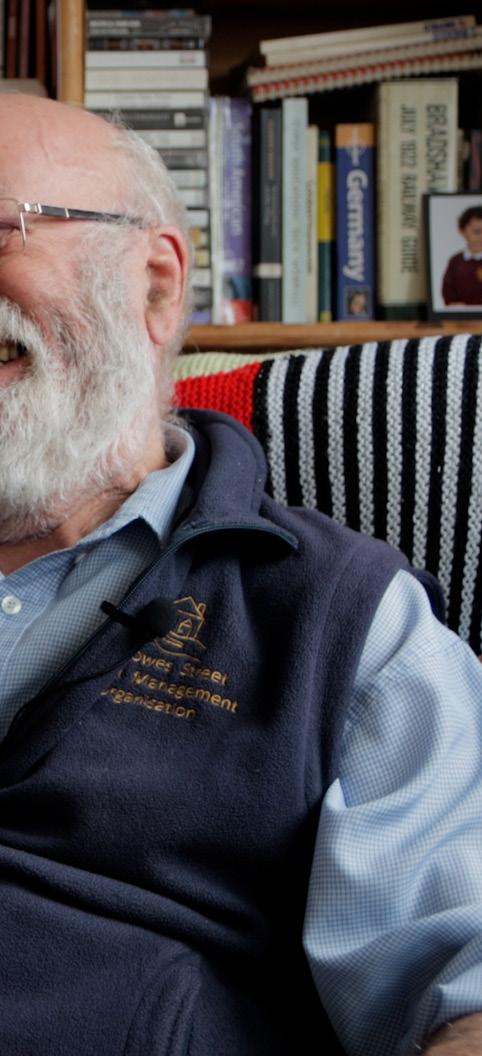
Pembrokeshire’s FRAME project helped thousands of people
Much-needed relief for energy debt is now available for households in West Yorkshire through a Warmer Homes Fund and Free Home Energy Advice visits.
West Yorkshire-based YES Energy Solutionsis helping to reduce households’ energy bills and make homes greener through free Home Advice Visits across their local community.
The project is funded by the Department for Energy Security and Net Zero (DESNZ), allowing YES’ accredited experts to give advice from the comfort of people’s homes.
The team give thorough advice to help homes lower energy bills and keep warmer. They can also guide residents through any additional schemes for bigger installations or home upgrades.
YES is a community interest company, which means all their profits go back into their community to help achieve the company’s mission of alleviating fuel poverty. The latest reports from DESNZ make for some sombre reading, with the number of households in fuel poverty at similar levels over the past three years, from 3.16 million in 2020 to 3.17 million in 2023. Yet the average fuel poverty gap has increased from £348 to £417 in the past year, meaning that many homes are in deeper fuel poverty.
YES also created a Warmer Homes Fund, a pot of their profits dedicated to helping those in need – not just in West Yorkshire but across the UK.
Duncan McCombie, YES Energy Solutions’ CEO, said: I am proud of the hard work of the YES team, who have grown our community interest company to be able to provide this dedicated pot of relief funding to help those who most need it. We have over a quarter of a million pounds available to provide immediate help to those who may be in energy debt, need a new boiler and cannot afford it, or are struggling to top up their prepayment meters.
‘We’re here for you. We’ve been running for over 20 years and have helped thousands of households in Yorkshire and across the UK in that time.
‘This round of funding will only be made available until the end of March, with allocations distributed on a first come, first served basis, so we’re urging anyone who needs support or knows someone who needs it to get in touch with our teams and book their home visit.’
If you know people who may need assistance from the Warmer Homes Fund, please call YES Energy Solutions on 03301 359 110 or text the word ADVICE to 82228.
Following on from Pembrokeshire FRAME’s successful Slow Cooker Project over the 2022 to 2023 winter period, they looked into the demand for a similar project for winter 2023 to 2024. They found that there was a lot of interest and decided on a project, this time using soup makers. They set out to provide 40 families who were in receipt of means-tested benefits with a soup maker and then give them ingredients and recipes each week for 12 weeks. By week three, the project was at full capacity. Not only did they manage to fill the project, but they also extended the project, so it ran for 14 weeks. This enabled families across the county to cook themselves a
warm and healthy meal each week through the winter.
Pembrokeshire FRAME worked with a number of local contacts such as St. Marks VA School, Plant Dewi and sheltered housing officers to provide support for households in Haverfordwest, Milford Haven, Pembroke Dock and St. Davids.
The charity was already helping local people who have disabilities, mental health issues, and struggle with social isolation, with a supported work environment and many were able to be part of this project, as well.
Overseen by the project support
worker that we employed to deliver the project, our participants were able to assist with the tasks of the project, learning kitchen and administration skills, and building their confidence..
As part of the project, soup was supplied to our staff, participants, and volunteers on a Wednesday lunchtime.
Pembrokeshire FRAME’s final report shows that between October 2023 and February 2024, they helped 117 individuals across 40 households throughout Pembrokeshire who were facing food insecurity over the winter period by providing a staggering 2,300 portions of food.
Our dedicated training team offers courses for assisting households with fuel poverty, energy efficiency, fuel debt, decarbonisation and more.
We offer a range of accredited qualifications, short introductory-level courses, and tailored programmes to meet the needs of your organisation. We also offer a range of educational resources for schools, colleges, and higher education providers.
E-learning, webinar and face-to-face options are available to ensure that organisations can access our learning in a way convenient to them.
Funded places are available for certain subjects, eligibility criteria apply.
Qualification:
• Level 1 Using Energy in the Home
• Level 2 Introduction to Domestic Renewable Low Carbon Technologies
• Level 2 Award in Fuel Debt Advice in the Community 6281-16
• Level 3 Award in Energy Awareness 6281-01
• Level 4 Decarbonising Homes: Technologies, Impacts and Solutions
Short introductory-level courses:
• Changing Energy Related Behaviour
• Fuel Poverty and Health
• Introduction to Domestic Energy Efficiency
• Living with the Energy Crisis: Providing Advice to Vulnerable Clients
• Living with the Energy Crisis: General Overview for Non-Advice Workers
• Paying for Fuel
• Tackling the Cold
• Understanding Fuel Poverty and Health: Impacts on Mental Health
• Vulnerability in the Energy Market
Our package of education resources is developed and delivered in schools, colleges and universities by an experienced teacher, covering a wide range of topics and using a variety of learning techniques.
Go to www.nea.org.uk/training or contact lynsey.thompson@nea.org.uk.
Our first ever 5km walking event took place in January, starting at St James’ Park and ending at National Energy Action’s Newcastle headquarters. The event helped raise funds and awareness...
On 27 January, we teamed up with an amazing group of supporters for our first ever Walk for Warmth in Newcastle. This brand-new community event took participants on a 5km walk through Newcastle city centre, passing some of the city’s best landmarks, all to raise funds and awareness to fight fuel poverty.
We were incredibly lucky to have bright blue skies and sunshine as we took on the walk from the iconic St James’ Park. With dozens of people joining us, we walked together past Grey’s Monument, Newcastle Castle, and the Tyne Bridge, before finishing up at our Head Office along the Quayside. We then all enjoyed some much-needed warm drinks and tasty treats, kindly supplied by Ringtons, and heard from our Chief Executive, Adam Scorer.
We were so delighted to see such a great turnout for the first Walk for Warmth and want to say a huge thank you to everyone who came along on the day. A big thank you must also go to everyone who took on their own Walk for Warmth in their local area!
Thanks to the incredible support we get at events like this, we are able to raise even more awareness about fuel poverty and inspire more people to join us in the fight to end this national injustice. All funds raised from the Walk for Warmth will also provide vital funding for our services, so we can support more people who desperately need us.
The money raised provides vital funding so we can support more people
If you couldn’t make our Walk for Warmth this year, please like and follow our social media pages or sign up to our newsletter to stay up to date on next year’s! We hope to see more of you there to make it even bigger and better.
To sign up to our newsletter, please visit: www.nea.org.uk/support-us/subscribe/
For more information about our events, please email: donations@nea.org.uk.


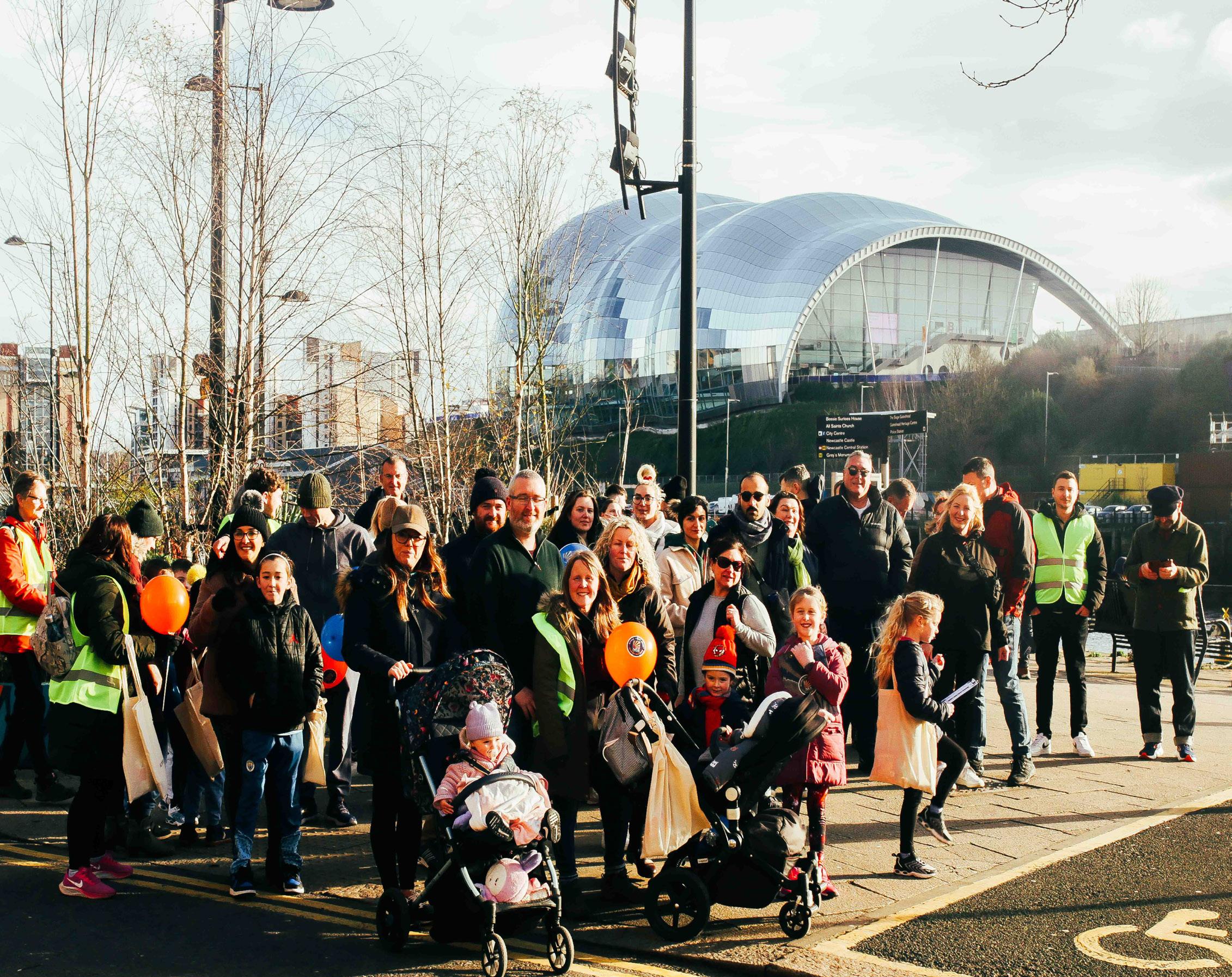


In January National Energy Action launched our annual Fuel Poverty Monitor showing a £19 billion funding gap in energy efficiency measures to bring houses up to standard...
We are now within a year of a general election. The winning party will likely have a mandate to see them govern for the vast majority of the remainder of this decade. That makes this a crucial general election for fuel poverty.
The fuel poverty target in England is a legal duty on the UK government to ensure that all low-income households in England reach a decent level of energy efficiency (EPC C) by the end of 2030. This is an important target for many reasons.
It helps secure a just transition to net zero, by decarbonising low-income homes as a priority at the same time as bringing down their energy bills. It is an approach that is favourable to the public, who see fairness as a key plank in efforts to reach zero. And it is the first legal energy target on the pathway to net zero. Missing it would reduce confidence in the UK government when it comes to meeting other, harder targets that are rapidly approaching. Put simply, it is key that political parties commit to meeting this target, not just through ambition, but through plans. It’s not just the right thing to do, it is crucial for our net zero journey.
With this in mind, National Energy Action made this target the focus of this year’s Fuel Poverty Monitor. We worked with independent consultants Gemserv to estimate the costs of meeting the England fuel poverty target. But perhaps more importantly, we worked on first of a kind modelling of the benefits of meeting the target, across a number of different actors and vectors.
We found that the costs are significant, but not unachievable. £18bn is needed to upgrade lowincome homes to EPC C. National Energy Action believes that this is a cost that should be met partially by the UK government, and partially by the landlords of rented properties. Fuel poor homeowners should not have to contribute at all.
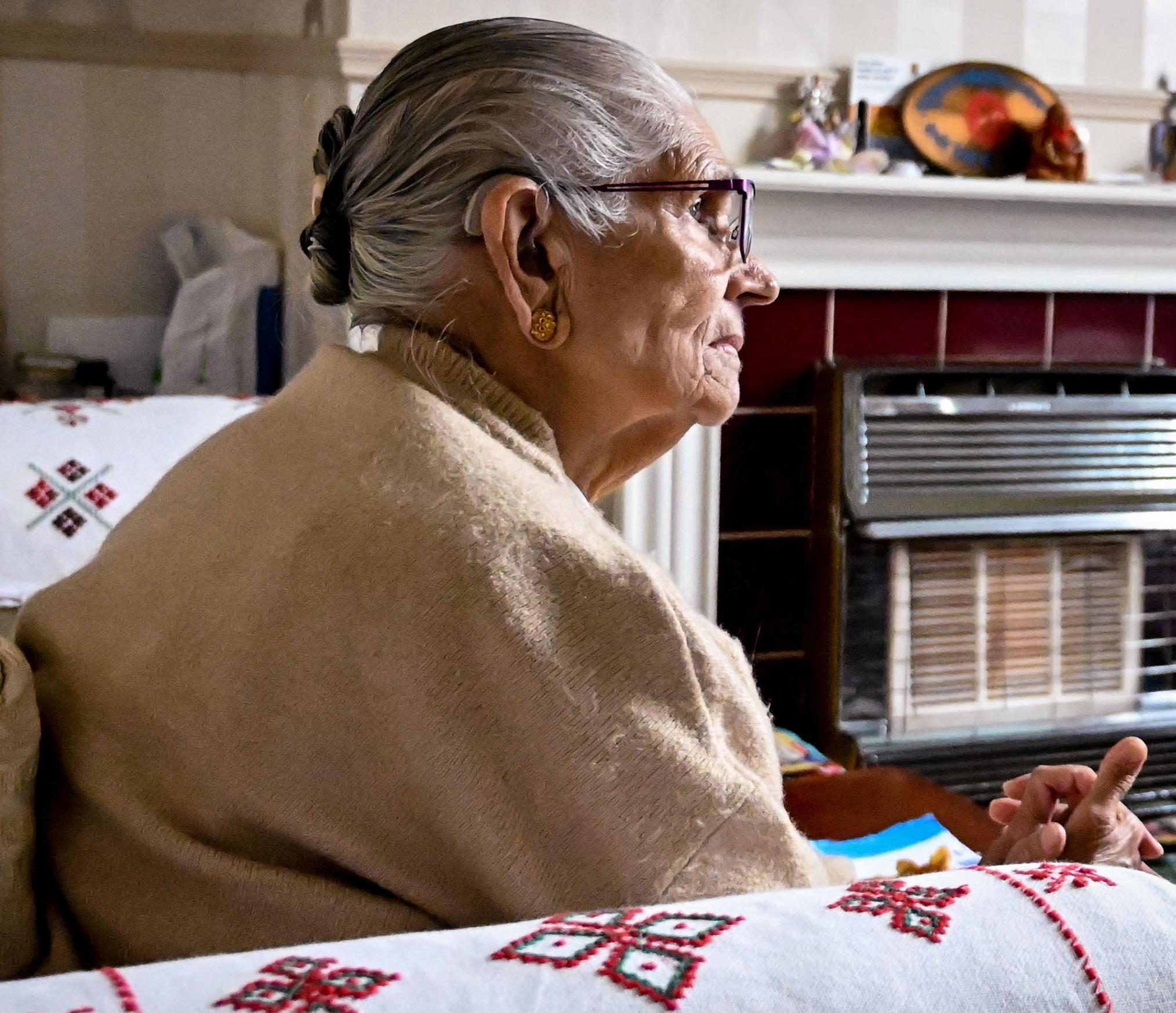
leveraged through regulation, coupled with incentives, then approximately £10.8bn would need to be committed by the UK government to upgrade lowincome homes up to the end of 2030 to meet the target. This is not a million miles away from some of the commitments we have already seen.
For every £1 spent, there’s £2 in benefits and that’s without including health benefits
If contributions from landlords can be
These are significant costs. But we found upgrading low-income homes comes with massive benefits. Doing so saves householders £5bn in energy bill reductions to 2030 alone. It reduces the cost of decarbonisation by £2.2bn. It improves air quality significantly, meaning that £15bn can be saved as we wouldn’t need to undertake alternative air quality schemes. It supports 22,000 jobs. And it creates £9bn in gross value added for the
economy. Overall, we found that for every £1 spent on meeting the target, there are £2 in benefits. That was even before the health benefits are factored in.
National Energy Action will be using this analysis over the coming months to ensure that, whoever wins the election, there are concrete plans to meeting the target and unlocking the vast associated benefits.
The plans we have seen are not yet enough to get there. There is more to do. But it is within sight. We know the solutions. Regulate the energy efficiency of rented accommodation. Continue successful schemes such as ECO. Target government spending on low-income households. Go to www.nea.org.uk/publications/ uk-fuel-poverty-monitor-nationalenergy-action-2022-23.
It’s a year since our Leicester Energy Action launched. Thousands of people have already been helped, hundreds of people have been trained and much, much more is planned...
It has been a year since we began our ‘Leicester Energy Action’ project.
Leicester was a priority area for us to work in as 20% of people live in fuel poverty – much higher than the national average. Over the last 12 months, we have worked directly with householders and created strong partnerships with Leicester City Council and other local organisations to be able to support householders who may be most marginalised.
The project has engaged with Dear Albert, an organisation that supports people with substance misuse. We’ve co-produced our advice-giving and support with a member of their team with lived experience.
time energy accounts, taking meter readings and payment options, and getting onto the Priority Services Register.
This has been a great piece of early prevention work when tackling fuel poverty. We have been working with Leicester City of Sanctuary to offer advice to asylum seekers and refugees, who face many barriers and vulnerabilities.
We’re passionate about continuing the partnership to help more people
We’ve been able to provide these to householders who will be moving into a new or first-time tenancy. We will be helping them set up first-
City of Sanctuary has been a great partner in assisting us in reaching these people, providing interpreters at our advice workshops and, most importantly, creating a safe and welcoming space. One of their team has now completed the Level 3 energy awareness training and will continue to deliver energy advice as part of the service and support they offer.
Staff from the Community Advice and Law Service and Action Homeless got together with Leicester Energy Action
and Reaching People to chat about a new cost-of-living project in Leicester, honing in on energy advice. Leicester Energy Action delivered an informative and fun energy awareness training session, with engaging discussions and useful energysaving tips shared.
The project has already received over 1,000 referrals for advice, and our team has provided lots of advice at 36 outreach sessions. We have visited eight schools, reaching hundreds of pupils. We have engaged with 26 organisations and trained hundreds of frontline workers.
To date, over 200 webinar learners have attended our short courses on a range of topics such as changing energy-related behaviour and living with the energy crisis. 20 learners have attended our Level 3 energy awareness training and are now fully qualified energy advisers supporting their clients in community settings.
We’re passionate about continuing our fantastic partnerships in Leicester.
If you would like to work with us, please email shelly.mcdonald@nea.org.uk.

and Marie Curie’s new report shows how the NICE NG6 guideline could are struggling with a cold home. Despite being recognised as a key resource, there has been limited when it comes to delivery. Our report shows that much more can be done to help those who are struggling...
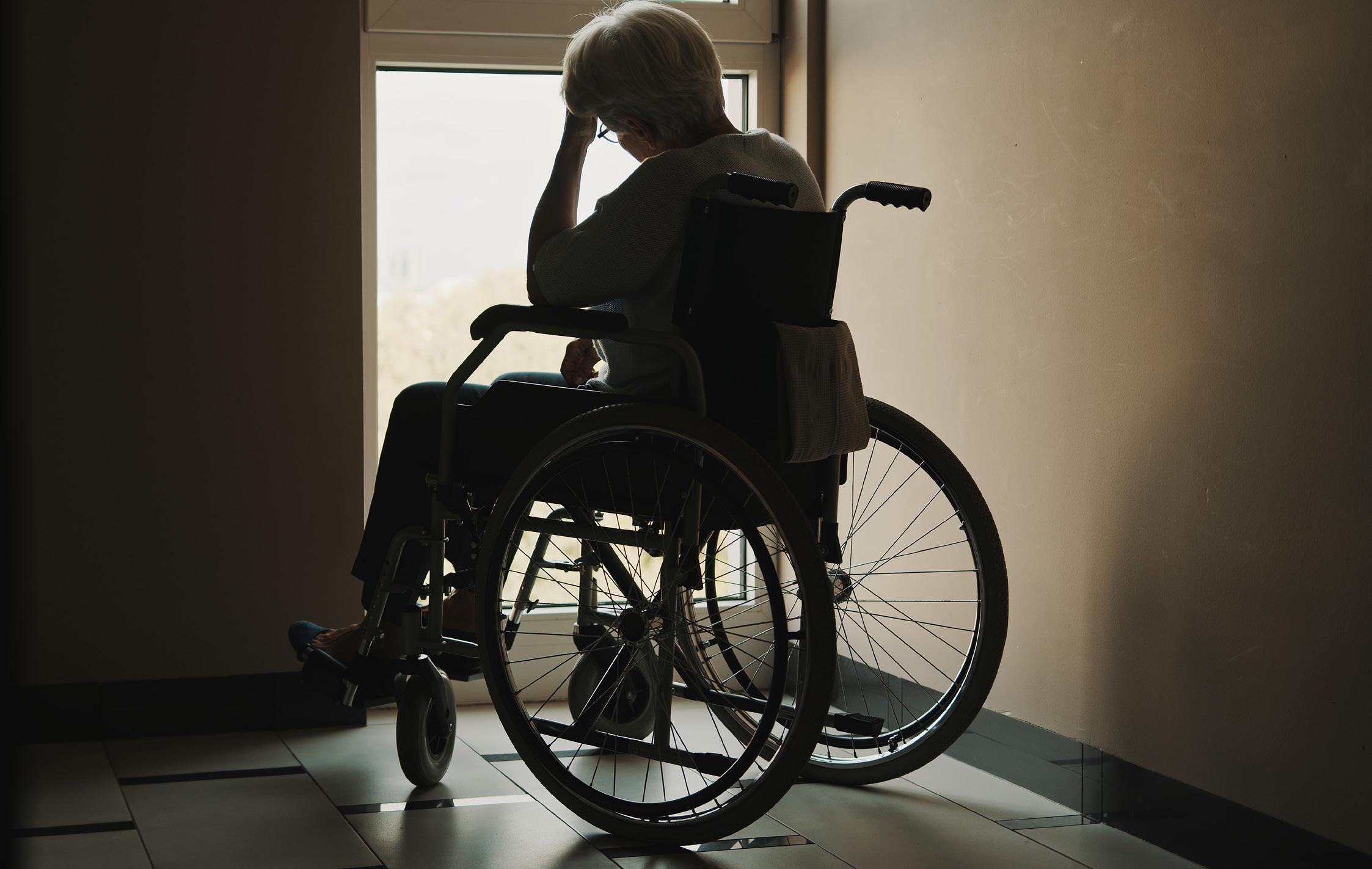
Anew report by National Energy Action and Marie Curie shows the importance of existing health guidelines in relation cold homes, and the difference they make for people who are terminally ill.
Since its publication in 2015, the National Institute for Health and Care Excellence’s (NICE) NG6 guideline has been recognised as a landmark resource for understanding and deploying appropriate action to support those at risk of worsening health because of cold homes and fuel poverty.
Despite being recognised as a key resource for tackling the health impacts of cold homes, there is limited
understanding of the extent to which the guidance has been implemented and related successes and challenges of delivery.
Progress to date has been patchy and inconsistent - more needs to be done
Further, there has been little consideration of the delivery and impact of NG6 in relation to key vulnerable groups, for example, those at the end of life – a group we know from research can experience a vicious cycle of fuel poverty.
Working in collaboration with Marie Curie, National Energy Action has undertaken critical research to address this gap in understanding and make
recommendations for action. The research examines how the recommendations in NG6 are being delivered, with specific consideration of what this means for people at the end of life in England and Wales.
Examining existing research, publicly available resources and reports and resources shared in response to Freedom of Information requests, the research provides a snapshot of what is happening in relation to the NG6 recommendations. It draws on the work of local authorities, health and wellbeing boards, integrated care boards, government, and other national bodies such as public
help people who are terminally ill and limited implementation and related success struggling...
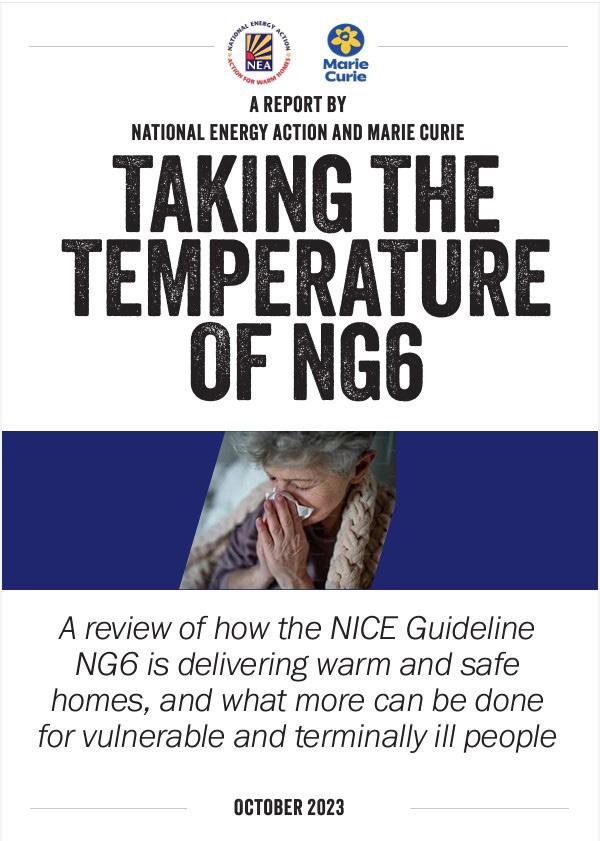
health. It focuses on NG6 recommendations considered more or most pertinent to those at the end of life or with a terminal illness, including the development of a strategy, establishment of a single point of contact, processes for safe discharge to a warm home, and efforts to raise public awareness.
While the research identified many positive examples of how NG6 is being implemented, the work concluded that more action is needed. Progress to date has been patchy and inconsistent.
In many cases, there is little to no data or detail on the implementation of NG6, which are a mandatory set of guidelines in England, and this means that either there are gaps in existing activity, or that work is happening but is not known about, making scaling up or learning from examples of best practice difficult.
You can read more about the research and access the report here: www.nea.org.uk/publications/taking-thetemperature-of-ng6.

Are you looking for a new challenge in 2024? This year we’re looking for more people to join us in some of the country’s biggest running events to raise vital funds to fight fuel poverty!
By joining Team NEA, you’ll be part of an amazing community of fundraisers taking on epic challenges to support some of the millions of people living in fuel poverty. Whether you want to join a fun run with your team, finally complete your couch to 5k, or put your stamina to the test in a half marathon, we have something for everyone.
Each one of our fundraisers will get personalised support every step of the way. We can help you reach your target and make the most of your event.
By taking on a fundraising challenge, you’ll be making a huge difference to support those who live in fuel poverty.
Water (5km, 10km and a half marathon)
26
7
6
6
16
4 and
Santa in the City 5km
If running isn’t your thing or you have an idea for a fundraising event, email donations@nea.org.uk
See our list of upcoming events on our website: www.nea.org.uk/ support-us/fundraise-for-national-energy-action/running-events.


Twitter/X and Threads: @NEA_UKCharity

Instagram: www.instagram.com/nea_ukcharity

Linked In: www.linkedin.com/company/national-energy-action

Facebook: www.facebook.com/nationalenergyaction
National Energy Action, the fuel poverty charity, campaigns so everyone can afford to live in a warm and safe home. This is something denied to millions because of poor housing, low incomes, and high bills.
Working across England, Wales and Northern Ireland, everything we do aims to improve the lives of people in fuel poverty. We directly support people with energy and income maximisation advice and we advocate on issues including improving the energy efficiency of our homes.
We do not work alone. Partnerships and collaboration have been at the heart of NEA for over 40 years, helping us drive better health and wellbeing outcomes for people struggling to heat their homes.
Email: focus@nea.org.uk
Web: www.nea.org.uk
NEA is an independent charity, Registration No. 290511. Company limited by guarantee. Registered in England, No. 1853927 Registered office: Level 6, West One, Forth Banks, Newcastle upon Tyne, NE1 3PA Tel: 0191 261 5677
Illustration: Indigo Design/ Shutterstock